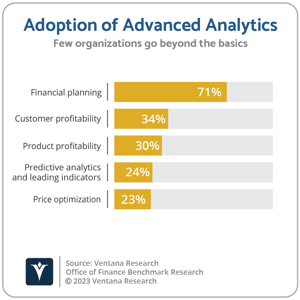OneStream Advances Generative AI to Improve Productivity
Written by

Robert Kugel
May 4, 2023 6:56:05 AM

OneStream offers a platform designed to serve the needs of accounting and financial planning and analysis organizations. The software handles financial close and consolidation, planning and budgeting, analysis and reporting. The most notable part of the company’s presentations at its annual user group meeting – Splash – was the strategy and roadmap for its two artificial intelligence initiatives, Sensible ML and Sensible GPT. The former, unveiled last year, is a platform approach to applying machine learning to business forecasting, while the latter harnesses the power of large language models such as ChatGPT to streamline the performance of almost any business process.
AI will be the most consequential technology of this decade for business computing. The scope of applicable uses for AI in business is vast, some of which are either in use for business today or will be shortly. Others are highly speculative or will be practical at some undetermined time. There are well-within-reach use cases for business-focused AI capabilities, including:
- Accelerating forecasting and planning while reducing bias.
- Automating analytics production to enable more time for analysis and thought.
- Providing task supervision to spot data and information input errors.
- Adding recommendations to facilitate decision-making.
- Automating commentary to enhance reporting.
The use of large language models, especially in the realm of generative AI, will substantially expand this list.
Ventana Research asserts that by 2026, almost all vendors of software designed for finance organizations will incorporate AI capabilities to reduce.png?width=300&height=300&name=Ventana_Research_2023_Assertion_DigiFin_AI_Performance_Benefit_23_S%20(2).png) workloads and improve performance. Increasingly, vendors of software aimed at the office of finance will differentiate offerings by the capabilities and accuracy of AI functionality. The main objective of AI-enhanced software is to have the applications do more low-value work so people can contribute more. Organizations will adopt this technology to attract and retain the best talent because there’s more time for workers to focus on tasks that require their expertise, experience and judgment.
workloads and improve performance. Increasingly, vendors of software aimed at the office of finance will differentiate offerings by the capabilities and accuracy of AI functionality. The main objective of AI-enhanced software is to have the applications do more low-value work so people can contribute more. Organizations will adopt this technology to attract and retain the best talent because there’s more time for workers to focus on tasks that require their expertise, experience and judgment.
Sensible ML focuses on addressing a longstanding yet unmet need to make planning a more effective business tool. Ventana Research selected OneStream Sensible ML for our Office of Finance Digital Innovation Award in 2022, reflecting its potential to significantly contribute to the improved performance of an organization. To put its advance in historical context, the application of predictive analytic techniques has, for the past couple of decades, been promoted as a means of improving the accuracy and timeliness of forecasts and plans. Today, our research shows that it is still only lightly adopted. Our Office of Finance Benchmark Research shows that only 24% of organizations use this predictive technology. Perhaps its limited use is the result of the difficulty that financial planning and analysis and other groups face in acquiring and managing the data that is necessary to make useful, accurate projections possible – an issue that OneStream’s platform addresses well.
Over the past year, the company has managed a limited rollout of Sensible ML, and the sessions have demonstrated some of the customers’ initial experiences using it. The company’s deliberate approach to the adoption of its technology recognizes the complex and interrelated issues that confront organizations when rolling out any new technology. It also highlights OneStream’s dedication to ensuring customer success in using its technology.
experiences using it. The company’s deliberate approach to the adoption of its technology recognizes the complex and interrelated issues that confront organizations when rolling out any new technology. It also highlights OneStream’s dedication to ensuring customer success in using its technology.
Similar to last year’s unveiling of Sensible ML, OneStream chose Splash to introduce Sensible GPT, its initial attempt to harness the power of large language models to perform a broad array of business functions and facilitate the use of OneStream’s platform. The introduction of ChatGPT strikes me as a seminal event, similar to the creation of the first internet browser, WorldWideWeb (later renamed Nexus), in 1990, which unleashed a wholesale transformation of commerce, culture and just about everything else. Similar to the internet, fashioning products and services around large language models is likely to be sweeping and astonishingly fast by historical standards, albeit not entirely overnight.
Sensible GPT is designed to harness the power of the ChatGPT generative AI utility (and potentially other industry- or domain-specific large language models) to work with OneStream and an organization’s data sources to automate or assist in the performance of a range of tasks. The ability of large language models to infuse natural language understanding, either written or verbal, means they are able to summarize, translate, engage in question-and-answer dialogs and assess sentiment broadly. This extends the usefulness of computing devices for most human activity. Large language models can offer broad utility or be tuned for a specific canon of knowledge or activities. They are capable of fine-grained personalization but also scale to the needs of large organizations and users. And they have already demonstrated significant versatility. Translating the potential of large language models could present challenges and issues of trust that are likely to predominate for years.
Generative AI, as my colleague has articulated, refers to a type of artificial intelligence capable of creating original content in the form of text, images or sound. It employs deep learning techniques, such as neural networks, to learn patterns and structures from existing data and then generate new content based on that learning. The essence of generative AI’s utility is its heightened ability to understand natural human language even when it is less than precise, to a far greater degree than current search engines offer. Its ability to infer meaning from a natural language input facilitates its performance in retrieving information, summarizing or classifying text as well as generating content, translating text into another language and writing computer code.
Generative AI has gained frenzied attention in the months since ChatGPT was unveiled. Its potential for harm has overshadowed the immense value that individuals and organizations can achieve through its use. A key challenge for generative AI in business is achieving a high level of quality and relevance with limited risk of errors or running afoul of legal or regulatory issues. To hope to do this, systems must be carefully prepared and constantly evaluated to ensure the generated content meets necessary standards. Sensible GPT is attempting to meet this requirement by training an organization’s version of the software on its specific corpus of knowledge, which can include a comprehensive set of its internally created documents, images, sound recordings, videos and structured data.
The OneStream platform can efficiently manage the ongoing acquisition of documents and other data sources from a range of enterprise applications such as customer relationship management, human resources, multiple general ledgers, purchasing and supply chain, to name a handful. This is the raw material of any generative AI process. It will encode the generative processes that organizations are likely to use. The objective is to give Sensible GPT the potential to faithfully create, or assist in creating, just about anything that is consistent with an organization’s style and practices, although initially these are likely to focus on business documents. Generative AI trained for specific uses in specific organizations has significant potential to foster substantial gains in productivity and operational effectiveness for a broad range of tasks while offering guardrails to limit the potential for harm.
Sensible GPT is still a work in progress. Its path to general release is likely to follow OneStream’s deliberate approach. Although it’s always best to withhold judgement about cutting-edge technology until it’s been in wide use, at this point its conceptual framework appears practical and sensible.
AI will be an increasingly important feature of business software through the end of this decade, but it’s already in the buzzword stage that makes it necessary for buyers and users of technology to understand what a particular vendor’s software can and cannot do. It’s also important for vendors to communicate clearly and concretely what they mean when they say “AI-enabled” and emphasize that these systems enhance — rather than replace — the capabilities of the humans employing them, especially through improved decision-making and by eliminating the need to perform repetitive work. OneStream has made a promising start in several difficult areas by harnessing the power of AI for business purposes to improve performance. Leaving aside the future potential of AI, I recommend that organizations looking for software for forecasting, planning, budgeting or managing the close, consolidate and report cycle (or both) include OneStream on the list of vendors for consideration.
Regards,
Robert Kugel

Robert Kugel
Executive Director, Business Research
Robert Kugel leads business software research for ISG Software Research. His team covers technology and applications spanning front- and back-office enterprise functions, and he runs the Office of Finance area of expertise. Rob is a CFA charter holder and a published author and thought leader on integrated business planning (IBP).